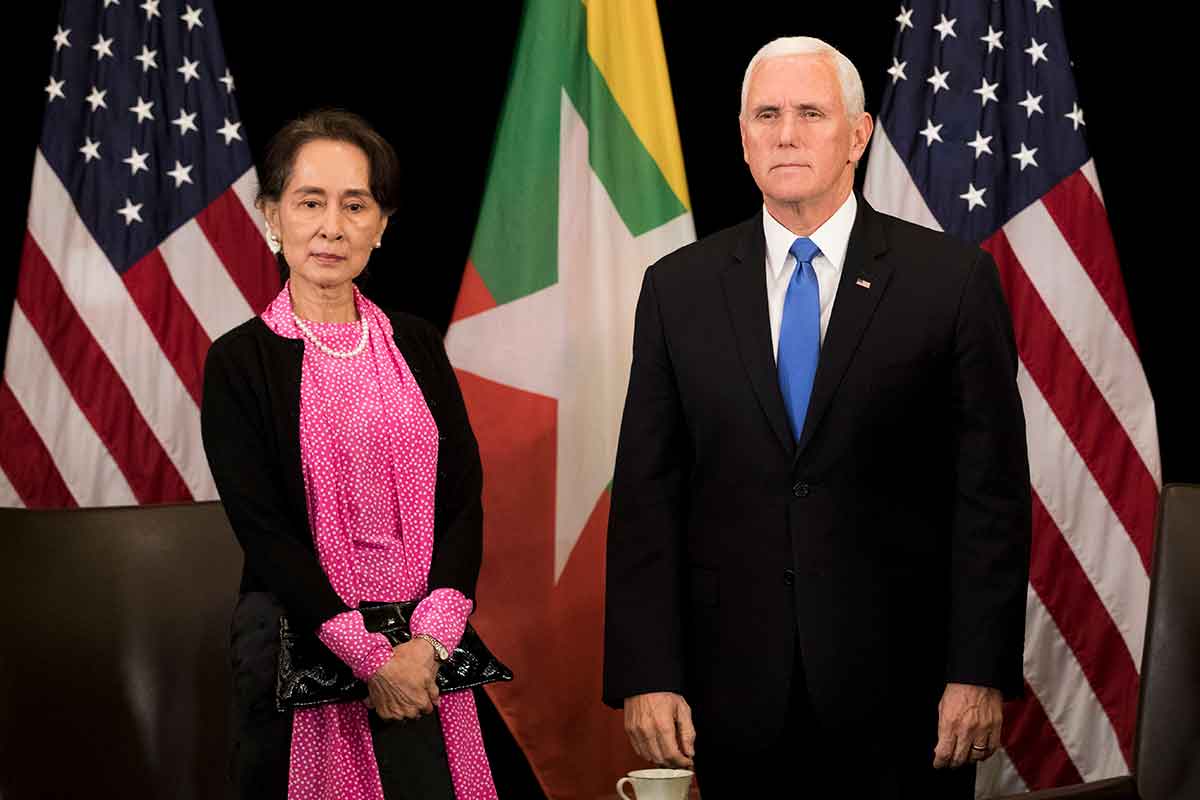The violence which drove 700,000 Rohingya Muslims from Myanmar into Bangladesh was "without excuse", United States (US) Vice President Mike Pence told Aung San Suu Kyi in stinging comments on Wednesday.
On the side-lines of the 33rd ASEAN Summit in Singapore, Pence piled the pressure on Myanmar's de facto leader, calling for an explanation of the jailing of two Reuters journalists over their coverage of the crisis.
Suu Kyi has seen her reputation as a rights defender shredded by her refusal to speak up for the Rohingya, a stateless group reviled in the Buddhist-majority country.
She has already had an Amnesty International honour revoked this week and faced sharp words from Malaysia's prime minister at a usually tepid meeting of Southeast Asian nations in Singapore.
In direct remarks as he sat next to Suu Kyi, Pence condemned the "violence and persecution" against the Rohingya as "without excuse".
Then in a front-on challenge to Myanmar's civilian leader, Pence said he was "anxious to hear about the progress" being made to hold the perpetrators accountable.
A crackdown led by Myanmar's army last year sparked an exodus of the Muslim minority into neighbouring Bangladesh, taking with them accounts of atrocities - rape, murder and arson of their villages.
United Nations (UN) investigators say the army's actions amounted to genocide.
Suu Kyi brushed off Pence's comments.
"In a way, we can say we understand our country better than any other country does," she said.
On Thursday a long-delayed - and heavily criticised - plan to repatriate the Rohingya was set to begin, despite dire warnings their safety will be in jeopardy if forced to return to Myanmar.
The process has undergone several false starts before.
Myanmar does not want its Rohingya, who are officially described as "Bengali" illegal immigrants.
And the Rohingya do not want to go back without security guarantees and citizenship.
But the fetid and overcrowded refugee camps in Bangladesh offer little future for the more than one million Rohingya who have fled successive waves of violence in Myanmar.
Jailed journalists
The Rohingya crisis has tarnished Myanmar's reputation among large sections of an international community which helped shape its transition from outright military rule.
Suu Kyi has no power over the army, which retains autonomy over all security matters.
But she has come under fire for not doing more to speak out against the generals' excesses.
She has also been criticised for her failure to speak up for two Reuters reporters jailed for seven years for breaching a colonial-era state secrets act after reporting on the extrajudicial killing of 10 Rohingya men during a military crackdown last year.
Pence called their case "deeply troubling", adding the US placed a "premium on a free and independent press".
A senior US official told reporters that Pence asked Suu Kyi directly and repeatedly to pardon the two reporters during their talks.
The official did not say how Suu Kyi responded.
The sentence prompted a storm of global outcry as an assault on freedom of speech, casting doubt on the direction and depth of Myanmar reforms.
In her only direct comments on the Reuters case Suu Kyi - herself once a political prisoner held under house arrest by the former junta - has said the pair were jailed under a fair legal process.
"They were not jailed because they were journalists" but because "the court has decided that they had broken the Official Secrets Act", she said in September.
Suu Kyi's civilian government had the power to drop the charges.
Reuters has appealed the verdict and has been lobbying for the release of the pair who they say were set up by police and arrested to silence their reporting.
The High Court is likely to take up to five or six months to rule on the appeal, during which time the reporters will remain in Yangon's notorious Insein prison.
After numerous delays, the first significant group of Rohingya - some 2,000 strong - is due to return to Myanmar on 15 November as part of a repatriation deal signed with Bangladesh a year ago.
However, the UN and rights groups maintain that conditions for their "safe, dignified and sustainable" return are still not in place. - AFP
